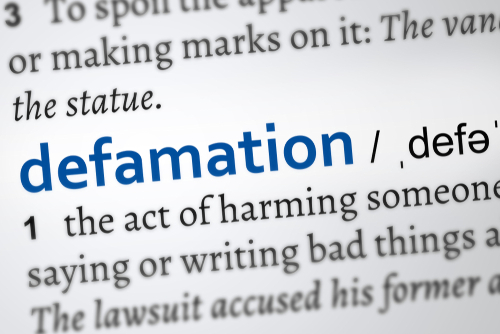1st Circuit upholds law making it a crime to ridicule people with false statements

Image from Shutterstock.
A federal appeals court has upheld a New Hampshire law that makes it a misdemeanor to make knowingly false statements that subject another person to “public hatred, contempt or ridicule.”
The 1st U.S. Circuit Court of Appeals at Boston rejected a challenge by Robert Frese in a Nov. 8 decision.
Judge Jeffrey Howard wrote the panel opinion, while Judge O. Rogeriee Thompson argued in a concurrence that the U.S. Supreme Court should overrule precedent upholding criminal defamation laws.
“By my lights,” Thompson said, “criminal defamation laws—even the ones that require knowledge of the falsity of the speech—simply cannot be reconciled with our democratic ideals of robust debate and uninhibited free speech.”
Frese was twice charged with violating the New Hampshire law.
Frese’s most recent arrest was by Exeter, New Hampshire, police in 2018. He was charged for online allegations that a retiring police officer was the “dirtiest” and “most corrupt cop” he ever had “the displeasure of knowing.” He also claimed that the officer’s daughter was a prostitute.
The police department dropped charges after the New Hampshire attorney general’s office concluded that there was no evidence that Frese knew that his statements were false.
Frese was previously prosecuted in 2012 for claiming on Craigslist that a life coach’s business was a scam, and the person was involved in a road-rage incident and the distribution of heroin.
Frese sued in late 2018 after charges were dropped. He was represented by the American Civil Liberties Union. He contended in an amended complaint that the criminal defamation law violated the First Amendment and the 14th Amendment.
The 1st Circuit rejected Frese’s arguments, citing the 1964 Supreme Court case Garrison v. Louisiana. The decision had upheld the criminalizing of false speech and said criminal sanctions could be imposed for statements that were false or made with reckless disregard for whether they were false.
The appeals court also found that the law was “not unconstitutionally vague” because it provides adequate guidelines for law enforcement and sufficiently clear notice.
The case is Frese v. Formella.
According to Courthouse News Service’s coverage of the case, 13 states still have criminal defamation laws on the books. They are Idaho, Kansas, Louisiana, Michigan, Minnesota, New Hampshire, New Mexico, North Carolina, North Dakota, Oklahoma, Utah, Virginia and Wisconsin.
The article said “another dozen or so states” make hate speech against minorities a crime.
Other publications with coverage of the opinion include the Volokh Conspiracy and Law & Crime.



